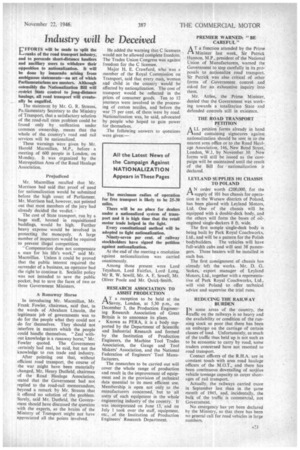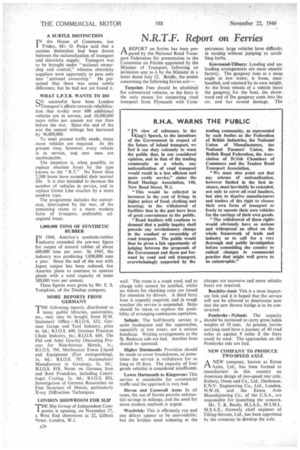Industry will be Deceived
Page 25

Page 26

If you've noticed an error in this article please click here to report it so we can fix it.
FFORIS will be made to split the 1.-• ranks of the road transport industry, and to persuade short-distance hauliers and ancillary users to withdraw their opposition to nationalization. It will be done by innuendo arising from ambiguous statements—au art of which Parliamentarians are masters. Although ostensibly the Nationalization Bill will restrict State control to Jong-distance haulage, all road transpod will eventually be engulfed.
The statement by Mr, G. R. Strauss, Parliamentary Secretary to the Ministry of Transport, that a satisfactory solution of the road-rail rates problem could be found only by unification under common ownership, means that the whole of thecountry's road and rail services will be nationalized.
' These warnings were given by Mr. Harold Macmillan, M.P., before a meeting of 600 people in London, on Monday. It was organized by the Metropolitan Area of the Road Haulage Association, Prejudiced Mr. Macmillan recalled that Mr. Morrison had said that proof of need for nationalization would be submitted before the high court of Parliament. Mr. Morrison had, however, not pointed out that most members of the jury had already decided the veirlict.
The cost of State transport, run by a huge staff, housed in requisitioned buildings, would be high. Further heavy expense would be involved in protecting the monopoly. A large number of inspectors would be required to prevent illegal competition.
"Compensation does not compensate a man for his life's work," said Mr. Macmillan. Unless it could be proved that the public interest required the surrender of a business, an operator had the right to continue it. Socialist policy was not intended to save the public pocket, but to save the faces of two or three Government Ministers.
A Runaway Horse In introducing Mr. Macmillan, Mr. Frank Fowler, chairman, said that, in the words of Abraham Lincoln, the legitimate job of governments was to do for the people what they could not do for' themselves. They should not interfere in matters which the people could handle themselves. "Zeal without knowledge is a runaway horse," Mr. Fowler quoted. The Government certainly had zeal, he said, but not the knowledge to run trade and industry.
After pointing out that, without efficient road transport, the course of the war might have been materially changed, Mr. Henry Duffield, chairman of the Road Haulage Association, stated that the Government had not replied to the road-rail memorandum, beyond a remark by Mr. Strauss that it offered no solution of the problem. Surely, said Mr. Dutfield, the Government should have discussed the question with the experts, as the brains of the Ministry of Transport might not have appreciated all the points involved. He added the warning that C licensees would not be allowed complete freedom. The Trades Union Congress was against freedom for the C licensee.
Major H. E. Crawfurd, who was a member of the Royal Commission on Transport, said that every man, woman and child in the country would be affected by nationalization. The cost of transport would be reflected in the prices of consumer goods. Ten to 12 journeys were involved in the processing of cotton textiles, and before the war 75 per cent, of them were by road. Nationalization was, he said, advocated by people who hoped to gain power for themselves.
The following answers to questions were given:— The maximum radius of operation for free transport is likely to be 25-30 miles.
There will be no place for dealers under a nationalized system of transport and it is high time that the retail motor trade helped in the fight.
Every constitutional method will be adopted to fight nationalization.
Ninety-seven per cent, of railway stockholders have signed the petition against nationalization.
At the end of the meeting a resolution against nationalization was carried unanimously.
Among those present were Lord Teynham, Lord Fairfax, Lord Long, Mr R. W. Sewill, Mr. A. E. Sewell, Mr. Oliver Poole and Mr. Quick-Smith.
RESEARCH ASSOCIATION TO ASSIST PRODUCTION
AT a reception to be held at the Savoy. London, at 5.30 p.m., on December 3, the Production Engineering Research Association of Great Britain is to announce its plans.
• Known as PERA, it is a body supported by the Department of Scientific and Industrial Research and formed by the Institution of Production Engineers, the Machine Tool Trades Association, the Gauge and Tool Makers' Association, and the National Federation of Engineers' Tool Manufacturers.
The researches to be carried out will cover the whole range of production and result in the improvement of equipment and in the provision of technical data essential to its most efficient use. Membership is open not only to the manufacturers concerned, but to all users of such equipment in the whole engineering industry of the country. It was incorporated on June 13, and on July I took over the staff, equipment, etc., of the Institution of Production Engineers' Research Department. PREMIER WARNED: "BE CAREFUL"
AT a function attended by the Prime Minister last week, Sir Patrick Hannon, M.P., president of the National Union of Manufacturers, warned the Government to step carefully in its proposals to nationalize road transport. Sir Patrick was also critical of other forms of Government control and asked for an exhaustive inquiry into them.
Mr. Attlee, the Prime Minister, denied that the Government was working towards a totalitarian State and defended controls still in existence.
THE ROAD TRANSPORT PETITION
ALL petition forms already in hand and containing signatures against nationalization should be sent in to the nearest area office or to the Road Haulage Association, 146, New Bond Street,' London, W.1, by November 30. New forms will still be issued as the campaign will be maintained until the result of the Bill for nationalization is declared.
LEYLAND SUPPLIES 101 CHASSIS TO POLAND
AN order worth £200,000, for the supply of 101 bus chassis for operation in the Warsaw districts of Poland, has been placed with Leyland Motors, Ltd. One of the chassis will be equipped with a double-deck body, and the others will form the bases of oil-, engined single-deckers 8 ft. wide.
The first sample single-deck body is being built by Park Royal Coachworks, Ltd., and will be a pattern for the Polish bodybuilders. The vehicles will have full-width cabs and will seat 38 passengers. Three heaters will be installed in each bus.
The first consignment of chassis has already left the works. Mr. D. G. Stokes, export manager of Leyland Motors, Ltd., together with a representative of Park Royal Coachworks, Ltd., will visit Poland to offer technical advice and supervise the trial runs.
REDUCING THE RAILWAY BURDEN
I N some areas of the country, the traffic on the railways is so heavy and the availability or condition of the running stock so poor that there has been an embargo on the carriage of certain classes of load. Unfortunately, as much of the traffic thus held up is not such as to be economic to carry by road, some traders concerned have not resorted to road transport.
Contact officers of the R.H.A. are in constant touch with area road haulage officers of the M.O.T., and there has been continuous dovetailing of surOlus vehicle tonnage capacity to cover shortages of rail transport.
Actually, the railways carried more in September last than in the same month of 1945, and, incidentally, the bulk of the traffic is commercial, not Government.
No emergencyhas yet been declared by the Ministry, so that there has been no general call for road vehicles in large numbers.
A SUBTLE DISTINCTION
IN the Rouse of Commons, last 1 Friday, Mr. 0. Peake said that a curious distinction had been drawn between the nationalization of transport and electricity supply. Transport was to be brought under "national ownership and control," whereas electricity suppliers were apparently to pass only into national ownership." He presumed that there was sonic subtle difference, but he had not yet found it.
WHAT L.P.T.B. WANTS TO DO
S° successful have been London Transport's efforts towards rehabilitation that to-day over 600 additional vehicles are in service, and 10,500,000 more miles per annum are run than before the war. Since the end of the war the annual mileage has increased by 94,000,000.
To meet present traffic needs, many more vehicles are required. At the present time, however, every vehicle is in service, rind new ones are unobtainable.
The intention is, when possible, to replace obsolete buses by the type known as the " R.T." No fewer than 2,500 buses have exceeded their normal life. It is also intended to increase the number of vehicles in service, and to replace Green Line coaches by a more modern type.
The programme includes the conversion, interrupted by the war, of the remaining trams to a more modern form of trtnsport, preferably oilengined buses.
1,000,000 TONS OF SYNTHETIC RUBBER IN 1944, America's synthetic-rubber 'industry exceeded the pre-war figure for output of natural rubber of about 600,000 tons per year. In 1945, the industry was producing 1,000,000 tons a year. Since the end of the war with Japan output has been reduced, but America plans to continue to operate plants with a total capacity of some 300,000 tons per annum.
These figures were given by Mr. E. S. Tompkins, of the Dunlop company.
MORE REPORTS FROM GERMANY
HE following reports, distributed to
▪ many public libraries, universities, etc., may also be bought from H.M. Stationery Office:—B.I.O.S. 632, German Gauge and Tool Industry, price 4s. 6d.; B.I.O.S. 640, German Precision Chain Industry, 6s.;. B.I.O.S. 649, The Piel and Adey Gravity Dieeasting Process for Non-ferrous Metals, Is.; B.I.O.S, 704, Mechanical Foam Liquid and Equipment (Fire extinguishing), is. 6c1.; B.I.O.S. 767, Accumulator Manufacture in Germany, 3s. 6d.; B.I.O.S. 818, Notes on German Iron and Steel Foundries, including Centrifugal Casting, 3s. 6d.; B.I.O.S. 826, Investigation of German Researches on Fine. Structure of Metals, particularly X-ray Diffraction Techniques.
LONDON SHOWROOM FOR SLIP 'THE Slip Group of Independent Com
▪ panies is opening, on November 27,
a West End showroom at 22, Gilbert Rtreet, London, W.1.




































































